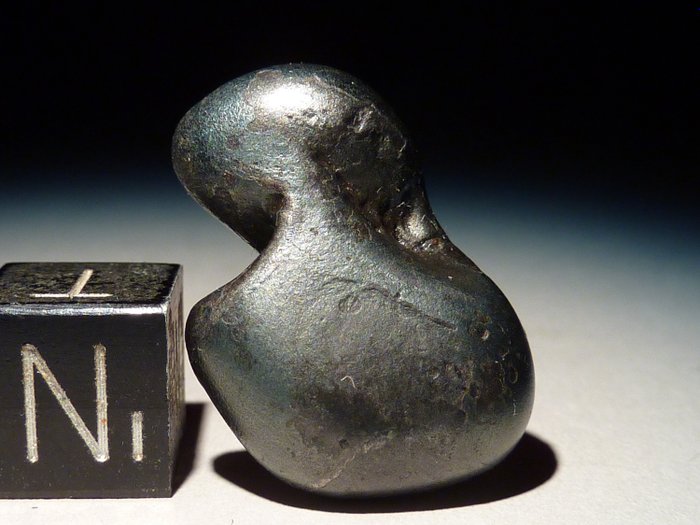Meteoryt sikhote alin wyprzedaż na sztuki , pytaj Warszawa Kup
Sikhote-Alin. Sikhote-Alin is an iron meteorite that fell spectacularly at 10:38 AM, February 12, 1947, in the Sikhote-Alin Mountains, northeast of Vladivostok, Russia. Witnesses to the fall saw a fireball brighter than the sun, that appeared from the North and then exploded violently at the very low altitude of ~3.5 miles. Fragments of the.

Sikhote Alin. 82g Meteolovers
The Sikhote-Alin meteorite fall was a massive impact event that occurred on February 12, 1947, approximately 440 km northeast of Vladivostok, Russia. The fall of this meteorite occurred in the daytime, and was observed by many eyewitnesses. This observational data allowed V. G. Fesenkov, chairman of the meteorite committee of the USSR Academy.
Sikhote Alin Meteoryt Gwiazdka z nieba +Certyfikat 12018805195
The Sikhote-Alin meteorite fell during daylight at 10:38 a.m. local time on February 12, 1947. Witnesses reported a fireball that was brighter than the sun. It came from out of the north -- about 15 degrees east of north and descended at an angle of 41 degrees. It left a trail of smoke and dust that was 20 miles long and lingered for several hours.
.jpg?mode=max)
COMPLETE SIKHOTEALIN METEORITE WITH CRYSTALLINE CLEAVAGE, Iron
This is 1 of 150 approved meteorites classified as Iron, IIAB. Search f The following entries were found for Sikhote-Alin in Buchwald (1975) [Buchwald, Vagn F. (1975) Handbook of Iron Meteorites.
OKAZJA !!!!! Meteoryt sikhote alin 924g szrapnel WARSZAWA Kup teraz
The Sikhote-Alin meteorite is a remarkable and historic cosmic visitor that crashed to Earth on February 12, 1947, in the Sikhote-Alin Mountains of eastern Russia. This meteorite fall is one of the largest witnessed meteorite events in recorded history, leaving an indelible mark on both scientific knowledge and the field of meteoritics.
METEORYT ŻELAZNY SIKHOTEALIN 27 g Warszawa Kup teraz na
Category: Nonchondrite Class: Differentiated iron Group: IIAB Catalog #: M350 Year Found: 1947 Location: Primorskiy Kray, Russia (Eastern Siberia, Russia?) The morning of February 12, 1947, this meteorite was abserve falling in Eastern Siberia, Russia at 1038 hours.

Michael Farmer Meteorites Sale Catalog
Sikhote-Alin is a temperate zone, though species typical of northern taiga (such as reindeer and the Ussuri brown bear) coexist with the Amur tiger, Amur leopard, and Asiatic black bear. The region holds very few wolves, due to competition with tigers. [2] The longest-lived tree in the region is a millennium-old Japanese yew. [3]

SikhoteAlin Iron Meteorite Shrapnel 1377 g Aerolite Meteorites
The Sikhote-Alin meteorite is a huge iron meteorite that broke up in the atmosphere and fell as a shower near the village of Paseka in the western part of the Sikhote-Alin mountain range in southeast Siberia at 10:38 am local time on 12 February 1947. Witnesses reported seeing a fireball that was brighter than the Sun. Coming out of the north.
.jpg?mode=max)
SIKHOTE ALIN METEORITE — AN ENGAGING PALMSIZED METEORITE, Iron, coarse
Exhibit Sikhote-Alin Exhibit Earth Impacts During Earth's 4.5 billion year history, countless meteorites have crashed onto the planet. Many of these impacts initially left. Exhibit Meteor Crater Shocked, Melted And Pulverized Rocks Helped Prove That Meteorite Impacts Can Make Craters. Exhibit On The Moon The craters on the Moon are a historical record of asteroid impacts—on Earth as well.
Sikhote Alin Meteoryt Gwiazdka z nieba+ Certyfikat 9986975591
Sikhote-Alin, IIAB. The single largest meteorite fall in modern history occurred on February 12th, 1947, at ~10:38 am local time. In Primorsky Krai, a remote northeastern province of Russia, locals watched as a massive fireball and smoke train rapidly traversed the sky. An artist, P. J. Medvedev, was sketching at the time of the fall.

SikhoteAlin Ijzeren meteoriet 18×12×10 cm 5.6 kg Catawiki
The Sikhote-Alin meteorite is classified as an iron meteorite belonging to the meteorite group IIAB and with a coarse octahedrite structure. It is composed of approximately 93% iron, 5.9% nickel, 0.42% cobalt, 0.46% phosphorus, and 0.28% sulfur, with trace amounts of germanium and iridium. Minerals present include taenite, plessite, troilite.
Meteoryt Sikhote Alin 1.8g Poznań Kup teraz na Allegro Lokalnie
Sikhote-Alin Iron Meteorite. Find / Fall: Fall - February 12, 1947. Location: Primorskiy kray, Russia. Classification: Iron IIAB. Total Known Weight: 23 Metric Tons. Sikhote-Alin Iron Meteorites look exactly like what you would think an iron meteorite should look like which makes this the perfect first meteorite to buy.
Sikhote Alin Meteoryt Gwiazdka z nieba+ Certyfikat 12018803968
Collection Information. As geologists searched for meteorites by digging beneath craters at Sikhote-Alin, they noticed something peculiar. Many fairly large meteorite samples were buried at the bottom of small craters measuring no more than two meters (6.5 feet) across. Larger craters, on the other hand, usually contained many very small.
Sikhote Alin Meteoryt Gwiazdka z nieba +Certyfikat 12999135639 Allegro.pl
Sikhote-alin meteorite information. The Sikhote-Alin iron meteorite is the largest observed meteorite fall in modern history. It rained a shower of fireballs into the thick forest of the Sikhote-alin Mountains in Eastern Siberia of Russia on February 12, 1947 at 10:38 hours. The flaming fireball, as bright as the sun, cast moving shadows in.

Meteoryt SikhoteAlin przycisk orientowany z liniami Catawiki
A piece of metal without holes or bubbles in it may be a meteorite. There are some minerals, though, that have a metallic luster, such as hematite. Rub your find on a piece of unfinished ceramic tile (it can be bought cheaply at many hardware stores). If the streak is red, the mineral is hematite. Another clue is whether or not you can break a.
METEORYT ŻELAZNY SIKHOTEALIN 28,4 g Warszawa Kup teraz na
The Sikhote-Alin meteorite fall is one of the largest in recorded history. Scientists estimate that its mass was approximately 220,000 lbs (100,000 kg) before it entered Earth's atmosphere. Additionally, these massive meteorites left impact craters, some as big as 85 feet across and 20 feet deep.